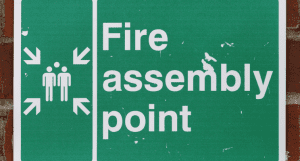
A fire in a commercial premises can have devastating and long-lasting effects. The immediate trauma and destruction are harrowing, and the cost to your business is potentially catastrophic – and if you haven’t met your legal obligations, the consequences could be even more profound.
Every year there are around 20,000 commercial fires in the UK. Kent firefighters have battled big blazes in commercial buildings in recent months, including a tyre recycling plant in Ashford and a furniture warehouse in Crayford. Both of these fires completely destroyed the buildings and seriously impacted neighbouring businesses and homes.
Government data shows that three quarters of fires in business premises are started by accident. The most common causes are electrical faults, such as overloaded sockets and poorly-maintained equipment, smoking and misuse of equipment.
So how can you ensure you adequately protect yourself, your staff and premises against the risk of fire? And what does the law say you must do?
Every business has a legal requirement to do a fire risk assessment, which must be documented if there are five or more employees. This must be completed by a competent person, should identify fire risks and hazards, and be regularly reviewed and updated.
Many businesses never recover after a major fire, so diligent risk assessment and prevention make commercial sense. Plus business owners and those responsible for premises can be fined – or even imprisoned – if they don’t meet their legal obligations.
So once you’ve assessed the risks and drawn up your assessment, what else do you need to do?
Your staff are your eyes and ears when it comes to fire safety. Fire marshals should be appointed, with the number dependent on head count, building layout and risk. In an office environment, one warden per around 20 staff would be appropriate.
It’s important that marshals are professionally trained and fully briefed on their responsibilities, which may include checking fire extinguishers, organising fire drills and giving new staff training in fire safety awareness. All staff must receive regular training and be aware of your fire safety procedures – this not only protects themselves and their colleagues but also YOUR business.
Fire-fighting equipment must be provided, and it’s crucial that staff know how to use it. Extinguishers require an annual maintenance test and high-risk premises, such as those using flammable materials, may need a sprinkler system or special hose reels.
Fire safety signs are also important, signposting exits and locations of extinguishers and alarms. These are legal requirements so it’s crucial to know what’s needed – and where. Fire doors must be clearly marked with the appropriate signage and fire assembly points must be clearly identified.
Fire alarms are not compulsory in smaller premises, but for most businesses an alarm system is recommended. Emergency lighting should also be installed to guide staff to safety if the main lighting fails.
As you can see, fire safety is a complex issue that requires careful consideration and a bespoke approach depending on your commercial activities. For more advice, Absolute Protection Group has over 75 years’ experience and can help with compliance, fire training, fire alarms, testing of electrical equipment and more. Click here for further information.
